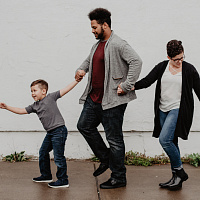Explaining Mental Illness to Children: Part II

According to the National Institute of Mental Health, half of all lifetime cases of mental illness begin by age 14. This means that a significant portion of those with some type of mental illness began to experience symptoms as a teenager. For teens who are experiencing symptoms themselves there are certain messages I try to convey.
- Being open and sharing thoughts or feelings with parents, counselors, and trusted friends is very important. Talking to a counselor or receiving mental health treatment is just like seeing a doctor about having a broken leg. The difference with mental health is that talking about feelings and experiences is necessary, not just so people can understand and help, but because talking helps. Being open with others is a way to feel better and get better.
- An important message is that mental health is just like physical health in the way that we must take care of it. When children are younger it’s our job to create opportunities or expectations for exercise, diet, positive thinking, creativity, learning, and positive socialization. Once someone is a teen, it may be more up to them to maintain a healthy lifestyle. It’s therefore important to communicate the necessity of keeping a balanced lifestyle, such as sleeping and eating properly. Also, and just like with adults, it is important for teens to be around other teens who are positive and supportive. Teenagers are in a position to be more affected by their peers than they were as children or than they will be as adults because they are in the midst of developing their own sense of identity. This makes their social environment all that more important.
- It’s useful to know that not every bad feeling is a symptom of a mental illness. A teenager who is aware of their depression or anxiety may identify any negative feeling as part of that mental health issue. But, feeling bad is not necessarily a problem! There are many reasons we can feel bad and feeling badly at times is part of being human. Anxiety in particular can be a very useful emotion because it signals to us that something is wrong. So, managing feelings is one thing, but the goal is not to be happy or discomfort free at all times.
- Teenagers have the ability to be good patients- which means being honest and aware of themselves enough to be good reporters. I encourage teens to journal or make lists in order to remember when symptoms happen and how intense they are, along with questions they may have when it is time to visit the counselor or doctor. This also empowers teens to be in charge of their own treatment. It can help a teen to maintain a sense of control and increase their self awareness. These skills are not only helpful for the current situation, but will be useful throughout life.
This article's content is from a blog by Pamela LiVecchi, Psy.D., posted at psychcentral.com.



























